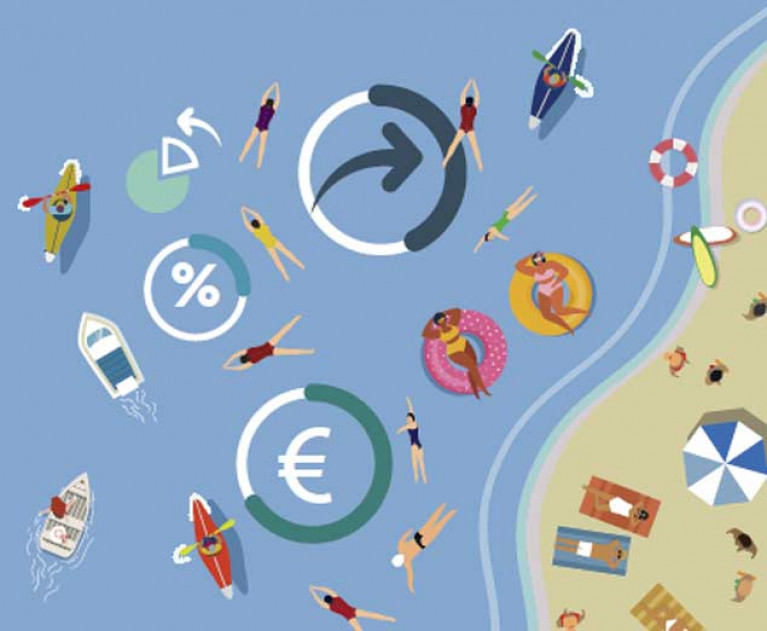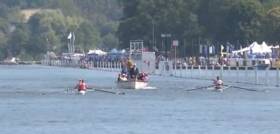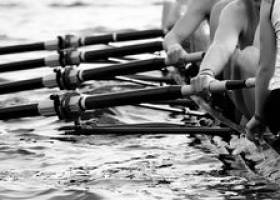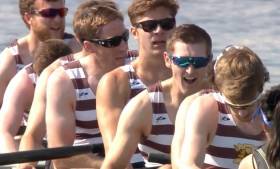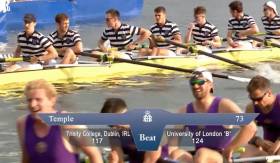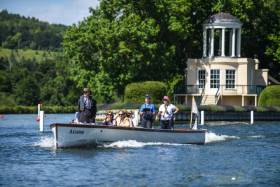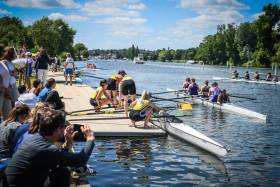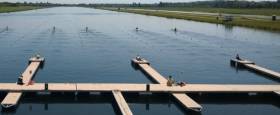Displaying items by tag: NUIG
Coastal & Marine Tourism Could Help "Reboot" Badly Hit Sector, NUI Galway Report Finds
Domestic coastal and marine tourism could help to “reboot” a sector which has been badly hit by the Covid-19 pandemic, a new report by NUI Galway (NUIG) finds.
“Marine-active” holidaymakers tend to stay longer and spend more than the average visitor, the study of domestic tourism by NUIG’s Socio-Economic Marine Research Unit (SEMRU) says.
Total expenditure by domestic tourists in coastal areas was estimated to be €698 million in 2018, which represents 35% of the total expenditure by domestic tourists that year, the study says.
The marine-related activity expenditure on overnight trips is estimated to have generated revenue of €381 million, with €172 million of this being spent on water-based activities.
The study found that average expenditure per coastal day trip in 2018 was €95, and the equivalent for coastal overnight trips was €310.
A survey for the study found that the most popular land-based coastal activities were walking/running along the coast/beach/cliffs/, beach or seaside trips, and coastal sightseeing.
The most popular water-based activities were sea swimming, surfing, recreational boating of different types and sea angling.
It notes that “significant differences in participation rates were observed across a number of socio-demographic classifications, including age, social class and education attainment levels”.
The results also indicate that domestic tourists undertake the majority of their marine activities on the west and south Irish coasts.
The authors argue that “given the observed differences in marine activity... across the social classes”, a “worthy policy objective would be ensuring that all sections of society can access.. the well-being and mental health benefits”.
. “Given the current crisis this is more important than ever,” the authors state.
“It also offers an opportunity to develop new marine tourism offerings focused on the expanding consumer demand for wellness services and products,” they state.
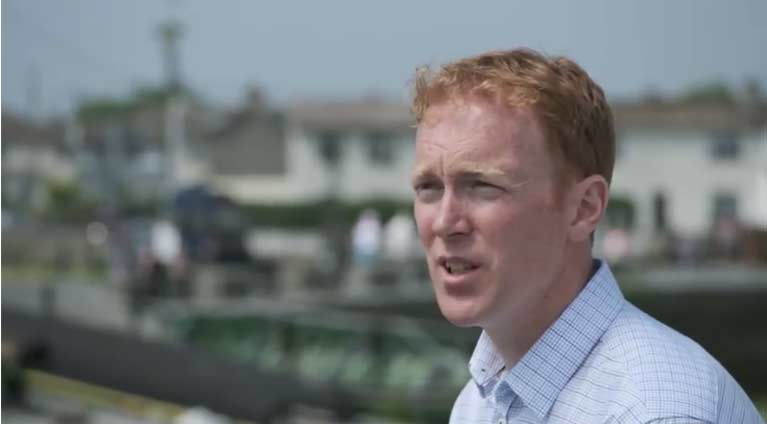 Co-author of the report Dr Stephen Hynes
Co-author of the report Dr Stephen Hynes
Dr Stephen Hynes, director of SEMRU and co-author, said that while the results predate the impact of the current pandemic, they “highlight the economic contribution that domestic marine tourism and leisure activity makes under normal circumstances to coastal regions, particularly those regions outside the capital”.
“Also, given that it is likely that the overseas tourism market will take much longer to recover, and Irish residents’ travel abroad will also be curtailed, the industry should be examining how they can maximise the return from the domestic tourism market this year and next,” he said.
Commenting on the report, Prof Alan Ahearne of NUIG’s Whitaker Institute noted that the World Tourism Organisation is forecasting that international tourist arrivals could plunge 60-80% this year, and “may remain at depressed levels next year”.
“Tourism in Ireland will be looking to domestic demand for recovery - and the evidence points to the huge potential for coastal and marine tourism to contribute to rebooting activity in this sector,” Prof Ahearne said.
Download the full report from NUIG below as a PDF
#Rowing: Seven different clubs won in the second session of finals on the second day of the Irish Championships. The races were run in hot sunshine.
Two women's finals senior finals were won in emphatic fashion. Georgia O'Brien of Kenmare won in the women's senior single sculls to give the club its second Championship. NUIG were also well in control in their victory in the women's senior pair.
Sadhbh Scully of Carlow, who is a junior, followed the trend in her big win in the women's club single sculls.
The women's junior 18 eights was a tighter affair, though Bann, once in the lead, held on strongly to rebuff Enniskillen.
The men's junior quadruple was a big event, with Lee taking the title ahead of Three Castles and Neptune.
Cork clubs are having a good Championships, and UCC took the women's club eights.
Skibbereen figured strongly in some finals, but had their first Championship win when Kealan Mannix won the intermediate single sculls from Shane Haugh of Castleconnell.
NUIG and Enniskillen Shine at Irish Rowing Championships
#Rowing: NUIG had a very good first day at the Irish Championships at the National Rowing Centre, taking four titles.
They won the women's senior four, the women's intermediate eight and the women's club coxed four. Sadhbh O'Connor and Fiona Murtagh added the women's senior double sculls for the Galway club.
Enniskillen took two notable titles: their men's junior eight came through under pressure from Colaiste Iognaid, and the women's junior four won from Bann.
Fionnan Crowley retained his title in the men's senior single sculls. The Castleconnell man - a brother of Aileen, who was doing well in the Ireland pair at Rotterdam - won by under a length from Niall Beggan of Commercial, who came at him hard in the closing stages.
UCD's senior four also successfully defended their title.
Tom Kelly won the junior single - the first Championships for the Kenmare club. Kelly, who turns 17 next month, is coached by Noel Casey, who is 85. Casey as based in Britain for decades and coached British women's crews to the Los Angeles Olympic Games.
Carlow's Sadhbh Scully and Ciara Egan won the women's junior double - a first title at this level for the club.
Trinity won the men's club eight in a good race, while Cork Boat Club won the men's intermediate coxed four, and Anna Liffey the women's intermediate pair.
NUIG pushed Queen's hard in the men's novice coxed quadruple, but the Belfast men came through. The women's novice coxed quad from Queen's also won, giving them two victories on a busy day.
O'Connor and Long Race World's Best Pair at Henley
#Rowing: Grace Prendergast and Kerri Gowler, the world’s best women’s pair, beat Sadhbh O’Connor and Natalie Long of NUIG and Skibbereen in the heat of the Hambleden Pairs at Henley Royal Regatta today. The Irish women, who had qualified, saw the New Zealanders move away from them and win well.
Henley Royal Regatta, Day Three (Selected Results; Irish interest)
Hambleden Pairs (Women’s Pairs, Open): G Prendergast, K Gowler bt S O’Connor, N Long
NUIG Take Women's Senior Four Title at Irish Championships
#Rowing: NUIG won the much-anticipated women’s senior four final at the Irish Rowing Championships today. Trinity made the early moves, but NUIG moved before halfway, with Commercial and Cork Boat Club also coming into contention. From there the Galway club took it and won from Commercial by over three seconds. Cork were third.
American Crews Oust Cork and NUIG From Henley
#Rowing: Cork Boat Club raced well but made their exit to New Jersey crew Montclare Mounties in the Thames Cup at Henley Royal Regatta. The Americans started powerfully and took an early one-length lead. Cork stayed calm and bit chunks out of the lead as the crews entered the enclosures area. Montclare would not yield: they finished well and won by three-quarters of a length.
NUIG secured an early lead and held it until the final stages of their race in the Prince Albert for student coxed fours. Columbia University then swept past and won by one and three-quarter lengths.
Yale, with Daire Lynch in the three seat, beat Princeton in a thrilling race in the Temple Cup. Princeton, who had trailed, darted to the line and came within a canvas of winning.
Henley Royal Regatta, Day Three (Irish interest; selected results)
Temple Cup (Eights, College): Yale (3 D Lynch) bt Princeton, canvas.
Thames Cup (Eights, club): Montclair Mounties, United States bt Cork Boat Club ¾l .
Prince Albert (Fours, coxed; Student): Columbia University, US bt NUIG 1¾ l.
Double Sculls (Open): G O’Donovan, P O’Donovan bt S Cox, T Oliver 4¾ l.
NUIG Rowers Win on the Line at Henley
#Rowing: NUIG had an exciting win over ASR Nereus of the Netherlands in the Prince Albert Cup for student coxed fours at Henley Royal Regatta. The early stages were tight, but the Dutch took the lead and held it down most of the course. Coming into the enclosures NUIG exerted fierce pressure – and it worked. They drew level and won by a canvas.
Trinity beat the University of London B by one and three-quarter lengths in the first round of the Temple Cup at Henley Royal Regatta. The Dublin University crew started well and fashioned a strong lead which their opponents could not whittle away.
Henley Royal Regatta, Day One (Selected Results; Irish interest)
Thames Cup (Eights, Club): Cork Boat Club bt Potomac, United States ¾ l, 6 min 35 sec.
Temple Cup (Eights, College): Trinity bt University of London B 1¾l, 6:40.
Prince Albert (Fours, coxed; Student): NUIG bt ASR Nereus, The Netherlands canvas, 7:13
Fawley (Quadruple, Junior): Neptune bt Tideway Scullers’ School ‘C’ 2/3l, 7:04.
Wins Take NUIG to Semi-Final at Henley Women's Regatta
#Rowing: NUIG’s development coxed four won twice on the second day of Henley Women’s Regatta and will compete in the semi-final on Sunday. They beat Aberdeen in the afternoon and then overcame Molesey by one length in the evening after a good race. They face Lea in the semi-final.
The NUIG crew which competed in the Championship Eight were beaten by Yale.
#Rowing: Two NUIG crews made it through time trials on the first day of Henley Women’s Regatta and will compete on Saturday. In the Championship Eight, NUIG will take on Yale University (scheduled for 2.40), while the Development Coxed Four have been drawn to take on Aberdeen C at 2.04. Tribesmen were allowed only to compete in the time trial of the Championship Eight.
Three Irish crews made their exits: UCD’s eight, the four from Queen’s University and Cork’s Boat Club’s Championship Double. Commercial’s Championship Lightweight Pair have a bye into the semi-final and go into action first on Sunday (10.20).
Henley Women’s Regatta (Irish interest)
Friday
Championship Eight: NUIG made it through Time Trial.
Aspirational Academic Eight: Bath Univ/Bristol Univ bt UCD, 2 ½ l.
Aspirational Academic Four: Exeter Univ bt Queen’s A, nro
Development Coxed Four: NUIG made it through Time Trial.
Championship Doubles: Leander bt Cork A (C Deasy, J Rigothi) 4 ½ l.
#Rowing: Commercial finished second to Leander in the men’s Championship Eights at London Metropolitan Regattta at Dorney Lake today. It was one of a string of good results for Irish clubs. NUIG and Tribesmen shone and teamed up to win the women’s Championship coxed four. UCC – who took second in the Championship single sculls through Ronan Byrne – also excelled. Trinity, the University of Limerick, Shandon and Castleconnell also had wins.
London Metropolitan Regatta, Dorney Lake (Irish interest; selected results, winners unless stated)
Men
Eight – Championship: 1 Leander 5:49.90, 2 Commercial 5:52.74.
Four – Championship: 3 Commercial 6:12.20. Tier Two: Shandon.
Four, coxed – Tier Three: Tribesmen 6:32.26. Academic, Tier Two: NUIG.
Pair – Tier Two: UCC 7:14.93.
Double Sculls – Championship: 2 UCC (R Byrne, H Sutton) 6:32.50. Tier Two: Castleconnell 6:42.50.
Single Sculls – Championship: 2 UCC (R Byrne) 7:03.99. Tier Two: Univ of Limerick (K Mannix) 7:18.36. Tier Three: St Michael’s (D O’Connor).
Women
Eight – Club, Tier Two: NUIG/Tribesmen 6:50.64. Academic, Tier Two: Trinity 6:57.77.
Four – Academic, Tier Two: Trinity 7:08.62.
Four, coxed – Championship: NUIG/Tribesmen 7:20.88. Tier Four: Univ of Limerick.
Pair – Championship: 2 Commercial (H O’Neill, R Morris) 7:46.57. Tier Two: NUIG 7:39.84.
Double Sculls – Championship: 3 London/Skibbereen (M Jackson, N Long) 7:28.48.




























